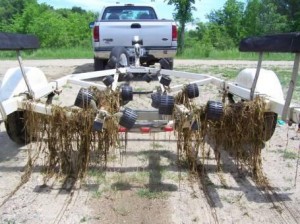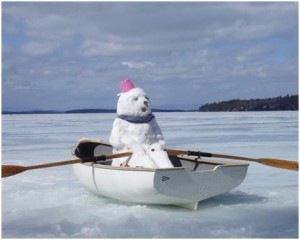Boat Repair MN | Fiberglass & Aluminum Boat Repair
Living in Minnesota comes with plenty of perks… but mostly it’s the beautiful lakes that make our state so special. Whether it’s to experience nature, to escape the pressures of the daily grind, to experience quiet, or to spend time with friends and family, Minnesotans love to spend time on the water. In fact, water is part of Minnesota’s roots, and spirit, and, to a great extent, our state pride or identity. So it is only natural that boating and fishing are such a valued part of our Minnesota heritage; it’s a way of life. But it is being threatened by quagga/zebra mussels, spiny waterfleas, faucet snails, or other prohibited invasive species.
Protect Your Boat and Motor From Zebra Mussels
 Not only are they are a significant threat to the continued enjoyment of very lakes, rivers, and streams we cherish, the damage they do to your fiberglass, aluminum, or even the metalflake on your new shiny boat, can end up costing you some big bucks in boat repairs. Unfortunately, some boat owners will see and feel the damage caused by zebra mussels first hand.
Not only are they are a significant threat to the continued enjoyment of very lakes, rivers, and streams we cherish, the damage they do to your fiberglass, aluminum, or even the metalflake on your new shiny boat, can end up costing you some big bucks in boat repairs. Unfortunately, some boat owners will see and feel the damage caused by zebra mussels first hand.
They can attach to any solid surface not protected by antifoulant paints. This includes any surface that may get wet, such as boat hulls, trailers, or anchors. Zebra mussels also have the potential to attach themselves to the prop and all areas of the motor, thereby either affecting the performance of the engine and or actually jamming steering equipment.
Quagga/Zebra Mussels
Quagga/Zebra mussels produce larvae (called veligers) too small to see with the naked eye. Newly settled young feel like sandpaper on smooth surfaces. As they quickly grow larger, Quagga/Zebra can be seen on boat hulls, especially around trim tabs and transducers along keels, and on trailers, anchors, and propellers. The mussels can also be found in or on boat bilges, ballast water, live wells, motors, fenders, life jackets, ropes – basically anything that comes into contact with infested water and can serve as a reservoir or “pocket” in which they can survive.
Boat Storage & Winterizing
 Winter lay-up is the perfect time for boaters and anglers to check their boat over for any conceivable place where AIS may be. For example, zebra mussels can be the size of a fingernail and their larvae are microscopic, making them difficult to find.
Winter lay-up is the perfect time for boaters and anglers to check their boat over for any conceivable place where AIS may be. For example, zebra mussels can be the size of a fingernail and their larvae are microscopic, making them difficult to find.
Here’s the thing… Aquatic invaders cannot swim across the land, but if you give them a lift they can travel for miles. So please remember to Clean, Drain and Dry Your Boat… Inside and Out!
Many Minnesotans have pulled in their boats and closed up cabins for the season. So, the Department of Natural Resources (DNR) also asks every cabin and lakeshore owner to watch for aquatic invasive species (AIS) when removing docks, boat lifts, swim rafts and other equipment from the water.
Anti-Fouling Paints and Coatings
Anti-fouling paint, bottom paint or hull coatings are highly specialized paints applied to the hull of boats to discourage or prevent the growth of organisms that attach to the hull. There are algae, mollusks including zebra mussels and barnacles, wood boring worms plus other critters that love to make the hull their home. These organisms can seriously affect the performance of a boat. They can also damage the hull. Anti-fouling your boat is never much fun, especially in winter. But it’s important if you want to keep your boat’s bottom clean. A clean hull is safe, fast and efficient, and a fouled bottom cuts your top speed, damages maneuverability and lowers your fuel economy. So, if your boat stays in the water at least part of the year, a good anti-fouling paint is critical for keeping it performing its best!
Anchor Marine Repair
Whether you do it yourself or are or hiring a Minnesota Boat Repair Shop to handle it, there are also specific legal requirements that boaters must follow when removing, transporting, and storing watercraft and equipment for the winter. It just so happens that Anchor Marine Repair is a permitted lake service provider in Minnesota, trained in aquatic invasive species and decontamination methods. It is one of many ways we are working to protect our water resources from human transport of invasive species. Our estimates and consultations are always FREE! AND we would be happy to pick up and deliver.

